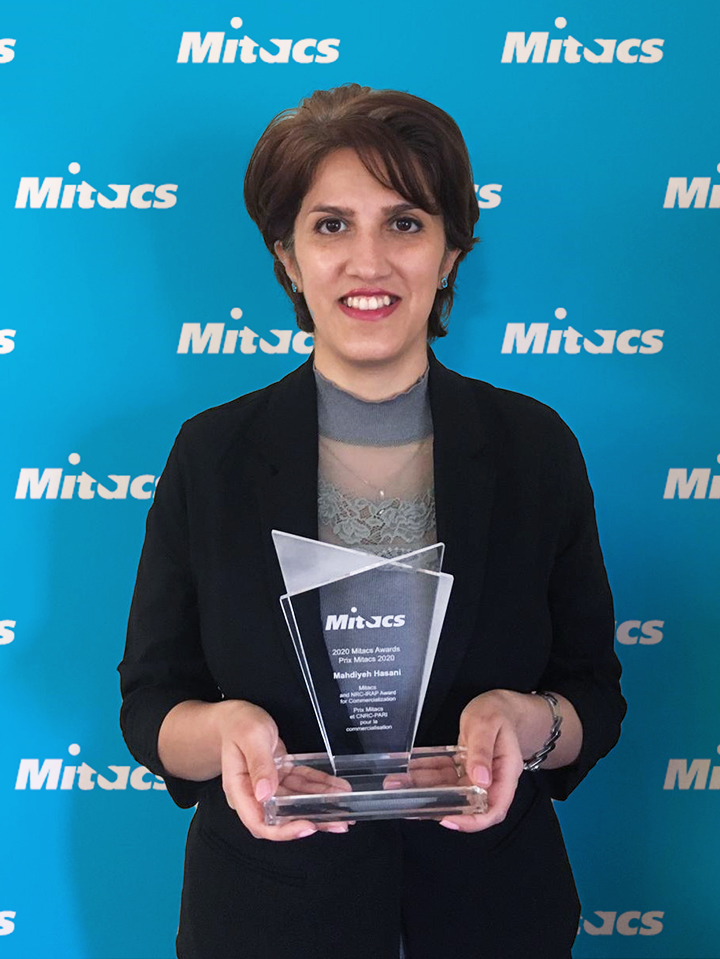
A University of Guelph researcher has earned national recognition for adapting a technology already used to decontaminate fresh produce into a disinfection device that kills the COVID-19 virus on personal protective equipment (PPE).
Mahdiyeh Hasani has received the Mitacs and NRC-IRAP Award for Commercialization.
Mitacs, a national innovation organization that fosters research commercialization, presented the award to Hasani at a virtual ceremony today.
The award recognizes a research idea brought to market or soon to be commercialized. Hasani is one of eight Mitacs national award winners selected from thousands of researchers who take part in the organization’s programs each year.
“It is tremendous to see Mahdiyeh Hasani recognized in this way, as she epitomizes the great strengths of our research strategy at the University of Guelph,” said Malcolm Campbell, vice-president (research). “She has used fundamental discoveries to fuel innovation that impacts individuals and communities the world over. Her work is helping us to grapple with a challenge of global proportions and thereby improve life.”
The rapid, waterless, portable disinfection device uses existing technology originally developed by Prof. Keith Warriner, Department of Food Science. The technology uses ultraviolet light, hydrogen peroxide and ozone to make hydroxyle-radicals that kill pathogens on fruits and vegetables.
This project was supported by the Natural Sciences and Engineering Research Council of Canada, the Ontario Centres of Excellence, and the Ontario Ministry of Agriculture, Food and Rural Affairs through the Ontario Agri-Food Innovation Alliance.
Hasani, who works with Warriner as a post-doc, adapted the technology to decontaminate N95 masks within 30 seconds for extending use or for reuse during COVID-19.
Clean Works, a Beamsville, Ont., company led by co-owners Mark VanderVeen and Paul Moyer, used the research to build the decontamination units.
Approved by Health Canada, the portable device can also sanitize face shields, goggles and hospital gowns. PPE is loaded onto conveyor racks and run continuously through the unit. The device can sanitize up to 800 N95 masks an hour. Clean Works now services 70 health-care institutions across Canada.
“I never imagined that this technology would advance this far, this quickly,” said Hasani. “We’re essentially replicating a reaction that occurs in nature and optimizing it to provide solutions for both industrial and general use.”
Clean Works is working with the U of G researchers to further develop its Clean Flow system. The device can also be used to decontaminate household items, including reusable grocery bags, phones, keyboards, toys, shoes and luggage.
The goal is to provide mini sanitization units to long-term care homes, day cares, hospitals, airports, retail businesses, schools and households, said Hasani. She aims to have a household version of the device ready next year.
“People remain extremely concerned about the spread of the virus and other germs,” she said. “This is a perfect example of how ideas in the lab can be transitioned to commercial processes and make a big difference in everyday life.”
In congratulating the winners, John Hepburn, Mitacs CEO and scientific director, said Canada benefits from innovation partnerships among industry, government and academia, ultimately helping to retain top talent and spurring economic recovery.
“Whether our researchers study abroad and bring their expertise back to Canada or develop groundbreaking ideas by tapping into resources across our country, their breakthrough work is changing the way we live and work,” Hepburn said. “Mitacs is honoured to play a role in supporting this important research and helping to advance innovation for the benefit of Canadians.”
Guelph MP Lloyd Longfield said he was pleased to see the Government of Canada’s Industry Research Assistance Program being used to help scientists address COVID-19-related challenges.
“The University of Guelph motto to Improve Life and to work across colleges comes together with this innovation from Mahdiyeh Hasani by applying research originally intended to improve plant life to improve human life, ranging from day cares for our youngest citizens to long-term care facilities and all points in between,” said Longfield. “Congratulations to the University of Guelph and our marvellous scientists for truly improving life around the planet.”